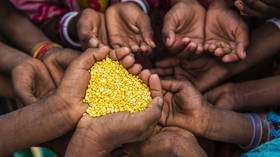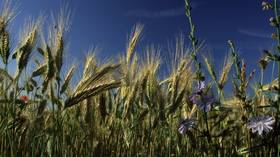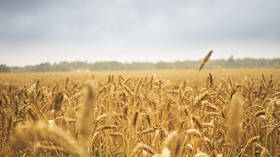Global food crisis a result of policy mistakes by US and EU, Putin aide tells RT

The looming global food crisis that could result from skyrocketing food prices was enabled by a series of policy mistakes by Washington and Brussels, Maksim Oreshkin, economic adviser to Russian President Vladimir Putin, told RT.
The conflict in Ukraine alone could not have caused the crisis on such a massive scale, Oreshkin said.
The UN Food and Agriculture Organization's international food price index shows that between April 2020 and April 2022, global food prices rose by more than 60%. The increase occurred for the most part before February 2022, when Russia launched its military operation in Ukraine.
In the four years from 2016 to 2020, the index grew by less than 7 points, but it increased by a whopping 27 points, from 98.1 to 125.7, in 2020-21. After the second year of the pandemic, the index stood at 141.1.
Since Russia’s military operation began, the index has risen by a further 17 points.
“Swings like that, with such huge increases in prices, are not happening due to one reason. It’s always a combination of a number of reasons which is leading to such a result,” Oreshkin, Russia’s economic development minister from 2016 to 2020, said.
He points to America’s overreaction to the Covid-19 pandemic as one of the first major factors that triggered the food price hikes. Since February 2020, the US “increased the money supply by almost 40%,” he said, adding that the $6 trillion the US printed to support its economy ended up flooding global markets, and led to the rise in food, commodity and energy prices.
Europe’s over-reliance on renewable energy, which drew resources away from food production, and on short-term gas contracts that led to gas price hikes in late 2021, are also significant factors, according to Oreshkin.
In early May, German Economic Cooperation and Development Minister Svenja Schulze said that the focus of some nations on green energy contributed to the food shortage. According to Schulze, up to 4% of biofuel in Germany is made from food and animal feed. “It needs to be reduced to zero, and not just in Germany but potentially internationally,” she told Bild at the time.
https://www.rt.com/news/555162-german-minister-world-worst-famine/
Oreshkin said these factors also led to a decrease in fertilizer production, which in turn hit harvests and drove up food prices. The waves of sanctions unleashed by the US and its allies on Moscow after the start of the military operation in Ukraine significantly exacerbated the crisis.
“It’s about a lot of sanctions imposed on the different fertilizer producers in Belarus, in Russia, it’s sanctions on ships, it’s sanctions on payments which halted trade,” he said, adding that Russia and Belarus both want “to export more food … more fertilizers,” but the “sanctions are blocking access to the global market and, of course, limit supply.”
According to Oreshkin, the 20 million tons of wheat supposedly blocked in Ukraine, which has become a hot topic among Western politicians and media, account for 2.5% of global wheat production. He also stated that Russia is prepared to partially substitute potential losses of Ukrainian wheat by exporting 13 million more tons this year than in 2021.
He also pointed to global food inequality as a root cause. “In reality, there is enough food on this planet,” but developed nations such as the US are simply consuming much more food than the others, he said, adding that people in the US consume on average “more than 50% calories per day more” than people around the world.
“They’re printing the money, they’re taking all the food, and of course they are taking the food from those who cannot afford it.”
He added: “if countries like the United States consume less, there will be enough food for everyone.”















